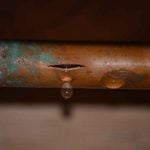How to Become a Plumber
Learn how to become a plumber through a local apprenticeship or trade school program.
Investing the time to become a licensed plumber offers a pathway to a well-paying career with a solid demand outlook.
Following the housing/banking crisis of 2008, large-scale unemployment plagued the construction industry for several years. During this time many skilled people in the trades retrained into other professions, while young members of the workforce looked elsewhere for employment. The result, according to Christina Wiersgalla, VP of operations at Wiersgalla Co. of Eau Claire, Wis., is that the average age of plumbers today has reached the mid- to late-50s. With comparatively few plumbers between ages 30 and 45, there is tremendous demand for new plumbers and a strong opportunity for young people interested in a plumbing career.
On This Page
What Do Plumbers Do?
Plumbers install, test and repair pipes and fixtures for conducting liquids and gasses in homes, commercial buildings and factories. Plumbers troubleshoot malfunctioning systems, interpret blueprints, write estimates and determine material needs at job sites. They often work in enclosed spaces, like under sinks, but also overhead, on ladders and out in the elements.
How Much do Plumbers Make?
According to the U.S. Bureau of Labor Statistics, the median wage for plumbers, pipe fitters and steamfitters was $56,330 in 2020. Wiersgalla says in Wisconsin, the mandated minimum wage for the profession is $33.44 per hour in 2020. Employers may pay more based on experience, additional qualifications and demand.
What Qualifications Do You Need?
You don’t need a college degree to become a plumber; a high school diploma or equivalency is all that’s required. Candidates must demonstrate proficiency in basic math and algebra, according to Wiersgalla. Because of the physical nature of the work the job demands a healthy back, shoulders and knees.
Required Education and Training for Plumbers
Although technical-school programs in plumbing exist, the vast majority of plumbers enter the profession through an apprenticeship program. These programs last four to five years and can be found through local trade schools, businesses and union chapters. Because apprentices are paid as they train and employers pay for their coursework, a pre-selection process may exist. For example, in metropolitan locations where workers are more plentiful, you may need to prove yourself as a laborer or helper before landing an apprenticeship contract.
These are the 5 things one plumber wishes they would’ve known when they were a rookie.
How Does Apprenticeship Work?
Becoming an apprentice starts with an aptitude exam, where candidates must demonstrate a foundation of basic skills required to be successful in the trade. After passing the exam, a panel of established plumbers interviews candidates. If approved by the panel an apprentice begins working with a starting salary at 45 percent of the regulated minimum. Every year, the wage progresses to 50 percent, 60 percent, 70 percent and 80 percent. A senior tradesperson supervises the apprentice.
During the first four years the apprentice also attends classes one or two nights a week conducted by a local technical school or trade union. In the fifth year the apprentice prepares to take the certification exam to become a journeyman plumber. After passing that exam, the candidate must also pass any state licensing requirements. Licensing costs remain the responsibility of the candidate; severe penalties can result from working without proper licensure.
Journeymen plumbers can work independently within the field without restriction, although some states require additional licensing for some classes of work. Depending on the apprenticeship contract terms, changing employers may be limited for a period of time, or the plumber may be required to repay a portion of the training fees the employer invested. Journeymen usually continue to accumulate experience and coursework to become a master plumber, which requires qualifying for and passing another exam. Aside from commanding a higher wage, master plumbers are allowed to own their own businesses and supervise other plumbers and apprentices.




